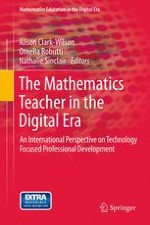2014 | OriginalPaper | Buchkapitel
Technology Integration in Secondary School Mathematics: The Development of Teachers’ Professional Identities
verfasst von : Merrilyn Goos
Erschienen in: The Mathematics Teacher in the Digital Era
Verlag: Springer Netherlands
Aktivieren Sie unsere intelligente Suche, um passende Fachinhalte oder Patente zu finden.
Wählen Sie Textabschnitte aus um mit Künstlicher Intelligenz passenden Patente zu finden. powered by
Markieren Sie Textabschnitte, um KI-gestützt weitere passende Inhalte zu finden. powered by
